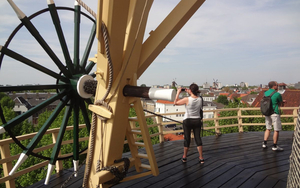*****
THIS intense co-production by The Octagon and Derby Theatre transports audiences back to the 1950s: post World War II and we hear middle class voices on the wireless and witness how one man’s frustration with life affects all those around him.
Though this play is difficult to watch, it remains compelling throughout
Neil Irish’s wonderfully evocative set highlights boredom and claustrophobia; from the metallic exposed pipes in the kitchenette to the ironing board sitting pride of place in the lounge. This one bedroom flat is a gladiator's arena, two platforms on either side of the stage allowing for new victims to enter Jimmy Porter’s world and be devoured.
Jimmy is married to Alison – a woman who seems lost and barely there. To her husband, she is a verbal sparring partner, but she does not fight back. Instead, she stands silently as he attacks her, taking away any every ounce of her self esteem and the air that she breathes.
Many find Jimmy so unlikeable and without humour that he alienates them - and they therefore find the play difficult to watch. But Patrick Knowles plays this complex character with complete understanding and resists the urge to depict him as a monster or a petulant child. Instead we see a man beaten down by grief and disappointment, darkly comic observations drawing you into his world.
 Jimmy Porter is the angry protagonist
Jimmy Porter is the angry protagonistThis does not justify his behaviour, but it means that John Osborne’s dialogue resonates even today. The frustration of being a young person viewed as a non-achiever is as relevant now as it ever was and this air of disappointment runs through Osborne’s play like a stick of a rock.
As Jimmy says: "One day, when I'm no longer spending my days running a sweet stall, I may write a book about us all...”
Augustina Seymour gives a less-is-more performance; she may seem restrained but Alison is a ghostly figure, taunted by Jimmy yet nothing without him. Jimmy Fairhurst’s Cliff is a bystander, who likes being an audience member, watching and waiting - loyal yet trapped, even though he can walk away at any minute.
Daisy Badger is brilliantly manipulative as Alison’s friend, Helena. She arrives at the flat like a calming figure, only to feather her own nest. Ivan Sott is also first-rate as Alison’s confused father, who knows that he belongs to a bygone era.
Jimmy Porter’s post war existence is so far from Harold Macmillan’s ‘You’ve Never Had It So Good’ soundbite that he creates his battleground and, even though this play is difficult to watch - much like Who’s Afraid Of Virginia Woolf - it remains compelling throughout.
Look Back in Anger runs at Bolton Octagon until 30 April.












